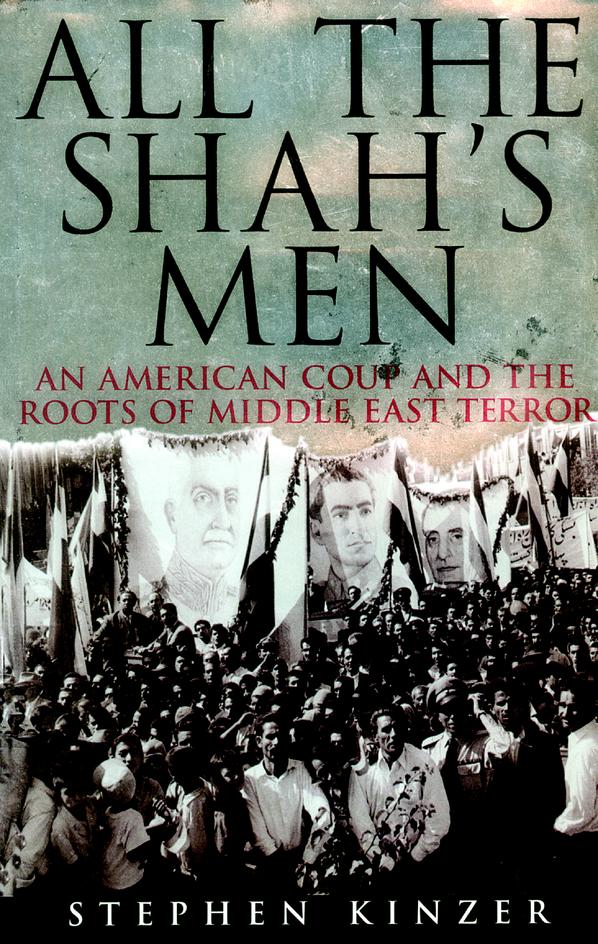Most people in the United States were both horrified and puzzled by this strange turn of events. After all, what did Iranians have against us, the sweet old U.S. of A.? Very few Americans knew anything about the way our government had tampered with Iran over the previous two decades.
Stephen Kinzer admirably fills the gap in our historical knowledge. In 1953, the CIA organized the overthrow of Mohammad Mossadegh, the democratically elected prime minister of Iran, and set a dictator in his place. It wasn't a proud moment in our history. It does, however, make for a great book. Kinzer deals with the subtle intricacies of the story in a way that makes All the Shah's Men read like a political thriller, yet he never succumbs to oversimplification.
Throughout the first half of the 20th century, a British corporation called the Anglo-Iranian Oil Company made arrangements with various corrupt Iranian government officials for the extraction of Iranian oil. The company and Iranian elites benefited hugely from the deal. The Iranian masses, on the other hand, got screwed.
Very little of the wealth generated from Iranian oil made it back into the hands of the impoverished people. The Iranians who worked in the oil industry lived like animals in the most squalid conditions imaginable, while British administrators languished in mansions like colonial kings—which, in effect, they were.
Anglo-Iranian was so wealthy and powerful that the company essentially controlled the entire country. It already had the Shah in its pocket. It strategically bought off key politicians and journalists with bribes.
At the same time, a pro-democracy movement began to gather force in the country. Iranians were tired of the corruption of the Shah and his foreign sponsors. While the Shah partied in swanky European clubs, blissedly indifferent to the trials of his country, the masses stewed in abject poverty. Mullahs began demanding his overthrow and the creation of an Islamic state. Communists demanded his overthrow and the creation of a Marxist state. Volcanic anger bubbled just below the surface of Iranian society.
In this atmosphere, a coalition of political parties, trade unions, civic groups and other organizations, under the leadership of Mohammad Mossadegh, rose to prominence. Called the National Front, the group was dedicated to obstructing the Shah and ridding the country of what most Iranians viewed as colonialist looters.
The National Front had massive public support. Mossadegh was elected to the Iranian parliament, the Majlis, and soon became prime minister. In that capacity, his main goal became the nationalization of Iran's oil industry.
This, of course, didn't sit well with either Anglo-Iranian or the British government. Britain sent negotiators to find a way out of the mess, but Mossadegh wouldn't budge. He wanted the British out of Iran, and he wanted them out fast.
This was the early 1950s. A couple years earlier, the Soviet Union had successfully tested an atomic bomb. In the late '40s, totalitarian communist governments were imposed on Bulgaria, Romania, Hungary, Poland and Czechoslovakia. In 1950, communist troops stormed across the 38th parallel in Korea and raced southward.
The United States began to believe that if Anglo-Iranian were nationalized Iran's economy would crumble, leaving the country ripe for a communist takeover. In those frightening early years of the Cold War, that was a risk the Americans weren't willing to take.
So, with the help of British intelligence, we staged a coup.
It's been estimated that Mossadegh had the support of approximately 90 to 95 percent of the Iranian public. As Kinzer so pointedly explains in his eye-opening book, overthrowing Mossadegh's democratic government and replacing it with a dictatorship was not popular. (What a surprise!) Before the 1953 coup, America was relatively popular in Iran. After the coup, the seeds of hatred were sown. They bore a very bitter fruit. It certainly didn't help that we cut ourselves a slice of Iran's lucrative oil pie, handing 40 percent of the industry to U.S. firms.
As the Shah's regime grew more repressive over the next two decades, hatred toward both the dictator and the nation that handed him back the reins of power grew along with it. The Shah outlawed the National Front and all opposition political parties, so when Iranians' anger came to a boil there were no moderate political organizations in which to funnel their frustrations. There were, however, plenty of Islamic fundamentalists waiting in the wings.
This explains the vehement anti-American character of Khomeini's revolution, which most Americans still can't seem to understand. Iranians aren't simply jealous of our wealth or freedoms. Their anger, ultimately unleashed on the administrators at the American embassy, had a much more specific source.
The CIA's overthrow of Mossadegh set a dangerous precedent. It also exposed the world to the United States' hypocrisy. While Americans lecture endlessly about the virtues of freedom and democracy, in the sphere of global politics, our government has often found free, democratic governments to be undesirable, and has done much to supplant them.
America's legacy in the Middle East during the second half of the 20th century was not a pretty one. More often than not we supported totalitarian states like Saudi Arabia, Kuwait and Saddam Hussein's Iraq. Budding Islamic radicals took this as evidence of our corruption. Their rage ultimately led to the terrorist attacks on Sept. 11 and other violent acts against the United States.
All the Shah's Men tells a gripping historical tale, and Kinzer gives his story the context necessary to reveal its relevance to our current global predicament. As Americans continue to scratch their heads, wondering why “they” hate us so much, Kinzer's book is essential reading for making sense of anti-American attitudes in the Middle East and beyond.









